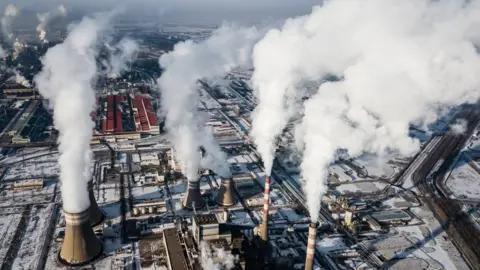The Bank of England says cutting carbon could push up prices
 Getty Images
Getty ImagesThe governor of the Bank of England Andrew Bailey does not just have rising prices on his mind this week. He was a delegate at the COP26 climate change talks, and central bankers like him have a big role in the "rewiring" of the financial system to achieve net zero.
But in fact there is a connection between these two worlds, says Governor Bailey himself. In an interview with me the governor says that the transition to net zero "could lead to permanent price level effects", that we have to "understand and deal with". Mr Bailey said people should "understand that this is the transition path we have to do".
Indeed he went further, saying: "I think we are already seeing some effects from climate change on prices now". In particular he said "a bit of the gas price story" - a reference to the 400% increase in prices over the past year - is the result of the world at the same time, shunning coal and chasing the same scarce natural gas supplies.
"As we substitute out of more damaging hydrocarbons, coal obviously being a case in point, during the transition, we will probably see increased demand for some other hydrocarbons [i.e. gas]."
Given that many political voices have tiptoed around the issue that the climate change transition being discussed in Glasgow is likely to have an impact on consumers, this would appear a significant statement of the reality.
It is of clear interest to an institution which is required in law to model, forecast and ultimately to control inflation.
The transition to a renewable economy will mean a higher level of prices in a long run transition period. The Bank's modelling suggests that unmitigated climate change will also harm the fabric of the economy.
But the governor believes while it is vital to recognise the economic benefits of saving the planet, it is also necessary that the public has a clear map on the economics of the climate transition.
